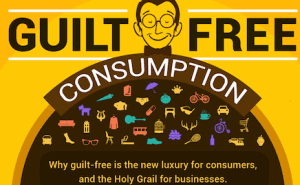
What’s the difference between fake goodness and the real thing? Good people want to know. In fact, we need to know because fake goodness is a marketable commodity. Companies know that doing the right thing is important to us, and so they work hard to connect their products with “doing good”. The success of Whole Foods Market (higher priced foods that are natural and organic) and the Tesla Model S (electric car for a hefty price) show how well companies can make a profit by appealing to our desire for healthy eating and sustainable energy.
In fact, according to trendwatching.com sustainability is the current trending value among good people in consumer economies. This is a wonderful development and a necessary and good shared value for our world community. But their marketing report issued at the beginning of 2014 correctly identified a rather painful reality – true sustainability will require good people to make difficult lifestyle changes. Here’s how trendwatching.com put it:
Growing numbers of consumers can no longer escape an awareness of the damage done by their consumption: to the planet, society, or themselves. But a mixture of indulgence, addiction and conditioning mean that most can’t substantially change their consumption habits. The result? A never-ending guilt spiral. [That’s their emphasis, not mine!]
Which creates exciting opportunities for brands that combine tackling this guilt spiral with consumers’ endless status seeking (still the driving force behind all consumer behavior).
As a Whole Foods customer and someone who almost bought an electric car, that stings a bit – because it’s true. I am not sure if how I’m spending my consumer dollars is making any measurable difference in our world, but I do know it eases my conscience a little bit. I feel much better about myself when I buy organic and bring my sustainable bags to the store. Of course, this is the shape that “endless status seeking” is now taking – we use our purchasing decisions to cultivate the good opinion of others. We all want that approving glance from our neighbor – no one wants to be judged, ridiculed, or be seen as politically incorrect, the greatest sin of all.
While needing the approval of others is normal and healthy, it can lead us into idolatry of those others. Because even though others can be a wonderful source of love and affirmation, even a sense of goodness, the source of our goodness is not others but God. In a consumer culture in which we worship the almighty dollar, the worship of God can take a back seat to a shopping trip to the mall. When we reject God’s love or deny the existence of that love, we must fill our need for affirmation somehow and so we turn to other less reliable, more self-interested sources. This is what René Girard meant when he said that in our modern age, in which “false prophets” declare that God is dead, we will become gods for one another.
Despite our best attempts to keep our hearts and mind centered on God through prayer and worship, we all succumb to the easy fix. I want to believe that paying a bit more for my groceries is good enough, but I’m afraid this is what the theologian James Alison calls “cheap goodness”. Why? Because it is much less costly than what real goodness requires. To be truly good we will have to summon the will to “substantially change our consumption habits”, as trendwatching.com observed. But changing habits is a long and arduous task and we are rightly fearful that despite our best intentions, we will fail. Just look at our accumulated New Year’s resolutions lying in the dustbins of our personal histories.
But rather than grasp after false goodness, we would do well to return to finding ourselves in the regard of our Creator who, before we could do, say or buy anything, declared us to be good. It is from a position of discovering ourselves to already be good that we can begin to be patient with ourselves as we try and fail and try again to change our habits from unsustainable ones to truly sustainable. Then we are less likely to fall prey to the quick fixes and guilt easing tactics of corporations and more likely to demand true sustainable practices from our companies and ourselves.











